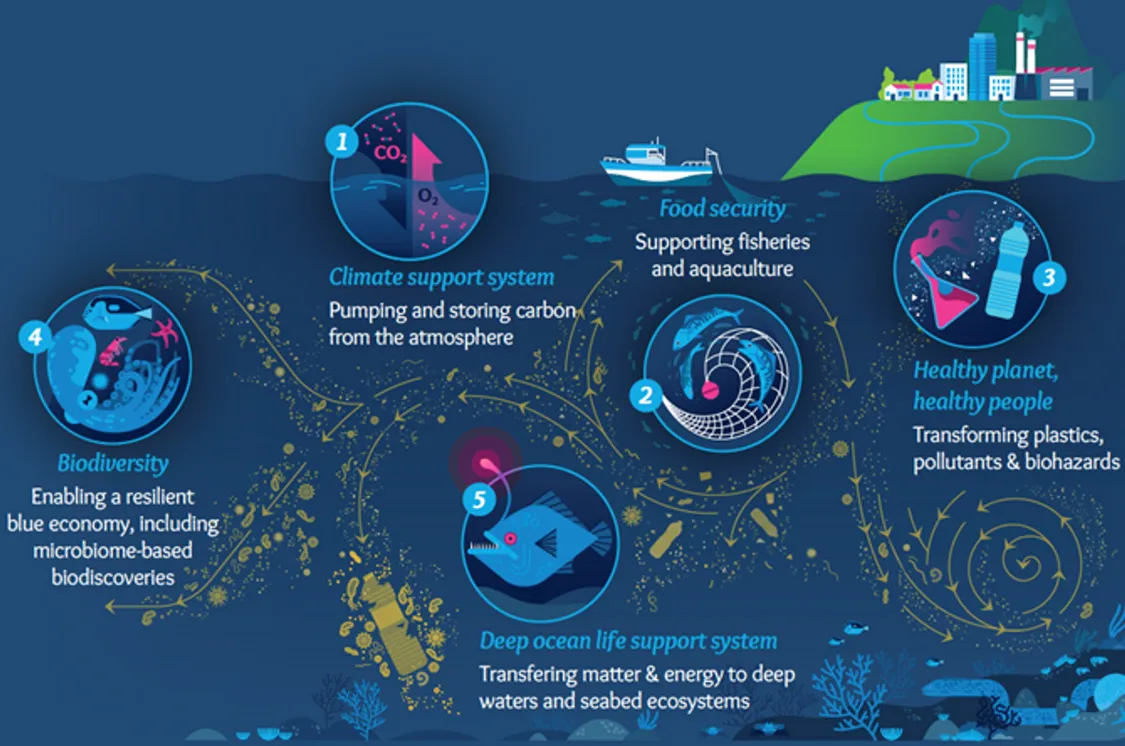By the AtlantECO coordination team
AtlantECO is an H2020 Research and Innovation project bringing together 36 partners from 13 countries in Europe, Brazil, and South Africa, with many collaborators from around the Atlantic basin.
Throughout the project, AtlantECO will engage with a range of stakeholders from citizens to scientists, and actors from the policy and the industry sectors, to increase awareness, develop capacity, promote responsible behaviour, and stimulate Blue Growth.
AtlantECO aims to develop knowledge-based resources to assess and forecast the sustainability of the Atlantic Ocean and its ecosystem services. These resources are based on novel observations and models describing marine microbiomes, plastics, and the plastisphere, and the connectivity of ecosystems at the regional, basin, and global scales. Knowledge will be shared among scientists, industry, policy-makers, and citizens in order to help sustain a Blue Growth strategy for an All-Atlantic community.
Objectives
ECOSYSTEMS: Assess dynamics of Atlantic marine ecosystems, their ecosystem services provision, and the interplay of both with socio-economic activities.
IMPACTS: Assess and predict the cumulative impacts of multiple stressors on ecosystem status and dynamics and Ecosystem Services provision, identifying their drivers and role on tipping points, assessing their changes in recovery of ecosystem structures, functions and services, and developing eco-socio-economic models to predict future trajectories.
CAPACITY BUILDING: Deploy a systemic strategy to build capacity and transfer knowledge for a seamless engagement between science, industry, policy, and society.
Scientific pillars
MICROBIOMES
The Ocean microbiome includes all the microscopic life in the Ocean. Every litre of seawater contains billions of microorganisms. The composition and activity of this group of microorganisms indicate the health of the marine ecosystem in which they live. This invisible majority, which makes up the Ocean microbiome, has received far less attention than larger charismatic species despite its essential role in the health of the Planet:
- Marine microbiomes are responsible for half of the oxygen produced on earth every day and capture 25% of the carbon generated by human activities.
- It regulates the temperature on earth
- It plays a key part in nourishing ecosystems
PLASTICS & THE PLASTISPHERE
One of the most pressing environmental challenges is the growing amount of plastic in our oceans. Most of this plastic quickly fragments into micro-and nano-plastics. Less than 250,000 tons of plastic is accounted for, floating on the surface of the ocean, which means that more than 99% of the plastic that ever entered the ocean is ‘missing’. Microplastic is equivalent to around 0.1% of global plankton biomass and it is increasing!
The plastic is transported by ocean currents and waves. Some of it passes through regions of high biodiversity where it can particularly impact marine life. Accurate maps of the transport and distribution of marine plastics are therefore crucial to assess its impact and to inform mitigation strategies.
AtlantECO will map plastic distribution in the Atlantic basin, identify or infer the putative sources, analyse the interaction between the plastics and the microbiome and quantify their transfer ‘up’ in the pelagic food web and their transfer ‘down’, toward the deeper oceanic layers and seafloor.
SEASCAPE AND CONNECTIVITY
Seascape is the mapping of the pathway and timescales on which ocean flows transport material between different regions. It’s a useful framework to characterize the interactions between physics, chemistry, and biology in the ocean. Like the atmosphere, the ocean has the equivalent of high- and low-pressure areas, fronts, trade winds and cyclones. The ocean is in constant motion, full of small-scale features that play a crucial role in transporting heat, nutrients, organisms, and microplastics between regions.
Ecosystem services
Ecosystem service frameworks have mostly been developed and implemented in terrestrial ecosystems. Their application has lagged behind in the marine environment, mainly due to a lack of data both on the supply side of the ecosystem service framework and on the demand side (monetary and non-monetary valuation data for benefits), which has arisen partly because there are few standardised methodologoes to collect these data in marine systems. The project will focus on five Ecosystem Services.

To learn more about AtlantECO, check out the project video, infographic, leaflet and more on the project website at atlanteco.eu/
